Related Research Articles
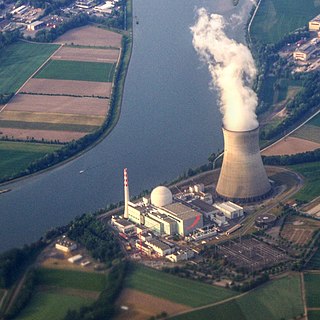
Nuclear power is the use of nuclear reactions to produce electricity. Nuclear power can be obtained from nuclear fission, nuclear decay and nuclear fusion reactions. Presently, the vast majority of electricity from nuclear power is produced by nuclear fission of uranium and plutonium in nuclear power plants. Nuclear decay processes are used in niche applications such as radioisotope thermoelectric generators in some space probes such as Voyager 2. Generating electricity from fusion power remains the focus of international research.
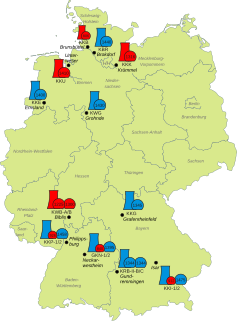
A nuclear power phase-out is the discontinuation of usage of nuclear power for energy production. Often initiated because of concerns about nuclear power, phase-outs usually include shutting down nuclear power plants and looking towards fossil fuels and renewable energy. Three nuclear accidents have influenced the discontinuation of nuclear power: the 1979 Three Mile Island partial nuclear meltdown in the United States, the 1986 Chernobyl disaster in the USSR, and the 2011 Fukushima nuclear disaster in Japan.

Nuclear energy policy is a national and international policy concerning some or all aspects of nuclear energy and the nuclear fuel cycle, such as uranium mining, ore concentration, conversion, enrichment for nuclear fuel, generating electricity by nuclear power, storing and reprocessing spent nuclear fuel, and disposal of radioactive waste.
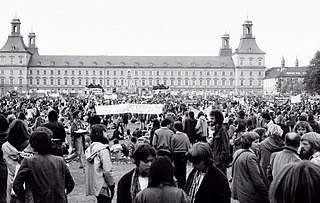
The anti-nuclear movement is a social movement that opposes various nuclear technologies. Some direct action groups, environmental movements, and professional organisations have identified themselves with the movement at the local, national, or international level. Major anti-nuclear groups include Campaign for Nuclear Disarmament, Friends of the Earth, Greenpeace, International Physicians for the Prevention of Nuclear War, Peace Action and the Nuclear Information and Resource Service. The initial objective of the movement was nuclear disarmament, though since the late 1960s opposition has included the use of nuclear power. Many anti-nuclear groups oppose both nuclear power and nuclear weapons. The formation of green parties in the 1970s and 1980s was often a direct result of anti-nuclear politics.

Nuclear power in the United States is provided by 93 commercial reactors with a net capacity of 95.5 gigawatts (GW), with 62 pressurized water reactors and 31 boiling water reactors. In 2019, they produced a total of 809.41 terawatt-hours of electricity, which accounted for 20% of the nation's total electric energy generation. In 2018, nuclear comprised nearly 50 percent of U.S. emission-free energy generation.
Nuclear power in the United Kingdom generated 16.1% of the country's electricity in 2020. The UK has 11 operational nuclear reactors at five locations, as well as nuclear reprocessing plants at Sellafield and the Tails Management Facility (TMF) operated by Urenco in Capenhurst.

New nuclear power plants typically have high capital expenditure for building the plant. Fuel, operational, and maintenance costs are relatively small components of the total cost. The long service life and high capacity factor of nuclear power plants allow sufficient funds for ultimate plant decommissioning and waste storage and management to be accumulated, with little impact on the price per unit of electricity generated. Additionally, measures to mitigate climate change such as a carbon tax or carbon emissions trading, would favor the economics of nuclear power over fossil fuel power.
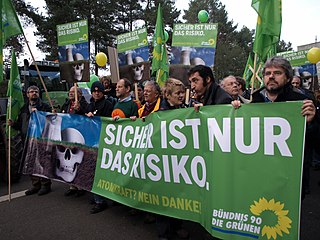
The anti-nuclear movement in Germany has a long history dating back to the early 1970s when large demonstrations prevented the construction of a nuclear plant at Wyhl. The Wyhl protests were an example of a local community challenging the nuclear industry through a strategy of direct action and civil disobedience. Police were accused of using unnecessarily violent means. Anti-nuclear success at Wyhl inspired nuclear opposition throughout Germany, in other parts of Europe, and in North America. A few years later protests raised against the NATO Double-Track Decision in Germany and were followed by the foundation of the Green party.
Canada has an active anti-nuclear movement, which includes major campaigning organisations like Greenpeace and the Sierra Club. Over 300 public interest groups across Canada have endorsed the mandate of the Campaign for Nuclear Phaseout (CNP). Some environmental organisations such as Energy Probe, the Pembina Institute and the Canadian Coalition for Nuclear Responsibility (CCNR) are reported to have developed considerable expertise on nuclear power and energy issues. There is also a long-standing tradition of indigenous opposition to uranium mining.

The anti-nuclear movement in the United Kingdom consists of groups who oppose nuclear technologies such as nuclear power and nuclear weapons. Many different groups and individuals have been involved in anti-nuclear demonstrations and protests over the years.
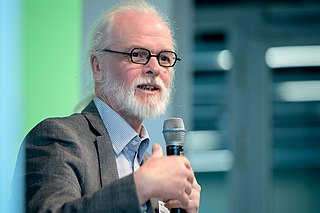
Mycle Schneider is a Paris-based nuclear energy consultant and anti-nuclear activist. He is the lead author of The World Nuclear Industry Status Reports. He has advised members of the European Parliament on energy issues for more than twenty years. In 1997 he received the Right Livelihood Award.

The nuclear power debate is a long-running controversy about the risks and benefits of using nuclear reactors to generate electricity for civilian purposes. The debate about nuclear power peaked during the 1970s and 1980s, as more and more reactors were built and came online, and "reached an intensity unprecedented in the history of technology controversies" in some countries. Thereafter, the nuclear industry created jobs, focused on safety, and public concerns mostly waned.

The late 1950s and early 1960s saw a strong push from the Spanish Government to establish a national nuclear power industry. In response to the surge in nuclear power plant plans, a strong anti-nuclear movement emerged in 1973, which ultimately impeded the realisation of most of the projects.

Since about 2001 the term nuclear renaissance has been used to refer to a possible nuclear power industry revival, driven by rising fossil fuel prices and new concerns about meeting greenhouse gas emission limits.

The World Nuclear Industry Status Report is a yearly report on the nuclear power industry. It is produced by Mycle Schneider, a founding member of WISE-Paris, which is the French branch of the anti-nuclear group WISE, which he directed from 1983 to 2003.
Jaitapur Nuclear Power Project is a proposed nuclear power plant in India. If built, it would be the largest nuclear power generating station in the world by net generation capacity, at 9,900 MW. The power project is proposed by Nuclear Power Corporation of India (NPCIL) and would be built at Madban village of Ratnagiri district in Maharashtra.
Antony Froggatt is an energy policy consultant and a senior research fellow at Chatham House. He is co-author of The World Nuclear Industry Status Reports.
M. V. Ramana is Professor and Simons Chair in Disarmament, Global and Human Security, and Director of Liu Institute for Global Issues, at the University of British Columbia’s School of Public Policy and Global Affairs. A physicist by training, he previously worked at the Nuclear Futures Laboratory and the Program on Science and Global Security, both at Princeton University. Ramana is a member of the International Panel on Fissile Materials, the Canadian Pugwash Group, the International Nuclear Risk Assessment Group, and the team that produces the annual World Nuclear Industry Status Report.
Energy Fair in the United Kingdom is a group of six people leading a campaign that claims that the nuclear power industry receives unfair subsidies, consisting of:
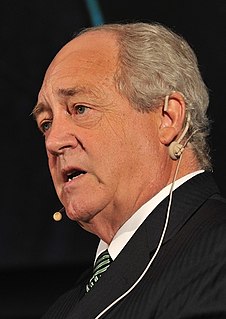
There are large variations in peoples’ understanding of the issues surrounding nuclear power, including the technology itself, climate change, and energy security. Proponents of nuclear energy contend that nuclear power is a sustainable energy source that reduces carbon emissions and increases energy security by decreasing dependence on imported energy sources. Opponents believe that nuclear power poses many threats to people and the environment. While nuclear power has historically been opposed by many environmentalist organisations, some support it, as do some scientists.
References
- ↑ Professor Steve Thomas Archived 2008-01-23 at the Wayback Machine
- 1 2 The Myth of the European "Nuclear Renaissance" Archived 2009-06-23 at the Wayback Machine